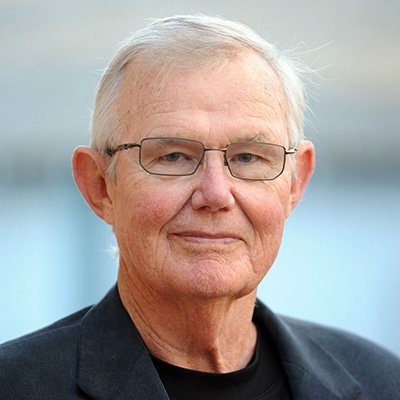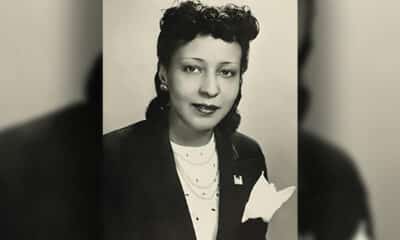Mississippi Today
Will Rogers looks to turn adversity into happy ending at Washington

“The worst thing that happens to you might be the best thing for you if you don’t let it get the best of you.”
Will Rogers, the famous American writer and humorist, wrote those words of wisdom back in the early 20th century. Will Rogers, the record-setting college football quarterback and Brandon native, would do well to take the message to heart a century or so later.

Rogers, the quarterback, is overdue for something good to happen. These last 13 months have been trying times, to put it mildly. It’s been more or less like a prolonged quarterback sack.
Put yourself in young Rogers’ shoes back in early December 2022. He had thrown for more yards and touchdowns than any Mississippi quarterback ever at the highest level of college football. No quarterback in Southeastern Conference history had completed more passes.
Then, on Dec. 12, 2022, Mike Leach, Rogers’ head coach at Mississippi State, died.
“It’s been tough,” Rogers said not even three weeks later, after helping State defeat Illinois in the ReliaQuest Bowl at Tampa. “Coach and I were so close and to lose a coach like that, a friend like that it hurt … it will continue to hurt.”
Wyatt Rogers, Will’s father and a Brandon high school football coach, says Zach Arnett, Leach’s successor, promised his son the plan was to keep Leach’s Air Raid offense.
“(Arnett) flat-out lied to us, sitting in our den,” Wyatt Rogers said. “He said they would be crazy to change offenses after all the success we had had…”
But change the offense was exactly what Arnett did, scrapping the Air Raid for a pro-style offense that rarely clicked. And then, in the sixth game of the season, against Western Michigan, Rogers suffered a shoulder injury that would sideline him for the next four games.
“Nobody is ever promised a life without scars, but that was tough,” Wyatt Rogers said.
State finished 5-7, losing to Ole Miss 17-7 in Will Rogers’ last game game as a Bulldog. Immediately, he entered the NCAA transfer portal.
Will’s adventure was only beginning. After being courted by several schools, Rogers settled on Washington, where Huskies head coach Kalen DeBoer recruited him to be the successor to Michael Penix Jr. Penix had led Washington to the national championship game. Rogers really liked DeBoer, enjoyed his visit to Seattle and looked forward to quarterbacking the Huskies in their first season in the Big Ten. “They throw the ball around a lot like we did my first three years at State,” Rogers said.
But then DeBoer took the Alabama job, and Rogers was back at square one. Not knowing who would take DeBoer’s place and whether the new coach would bring in his own quarterback, Rogers re-entered the portal on Jan. 12. Alabama, Miami, South Carolina, Western Kentucky and even national champion Michigan all became possibilities. And there were others, Iowa and Northwestern among them.
“The clock was ticking fast,” Wyatt Rogers said. “If Will was going to go through spring training at his new school, he had to make a move.”
The father and son met with Jedd Fisch, the coach Washington hired from Arizona, and with Brennan Carroll, Pete Carroll’s son, who will be the Huskies’ offensive coordinator. The Rogerses liked what they heard. Fisch very much wanted for Will to remain at Washington.
And so he will. Rogers made the announcement Tuesday night on X, the social media platform formerly known as Twitter. Fisch’s offense is not exactly the Air Raid, but it uses many of the same concepts. At Arizona, his teams threw the ball on nearly three-quarters of their plays and averaged more than 300 yards passing per game. And Fisch has 13 years of NFL coaching experience, something that factored heavily in Will Rogers’ decision.
In an interview with ESPN’s Pete Thamel, Rogers said, “Coach Fisch told me, ‘I want to treat you like a professional football player.’ I told him that’s what I want, and that’s what I am looking to do.”
Wyatt Rogers is pleased, even if his son will live and play all the way across the continent.
“It’s time to put all that other stuff behind him,” Wyatt Rogers said. “I think he’s learned some valuable lessons, not just about football but about life. I just want him to enjoy this last year of college football, see another part of the country, meet new people, play in new stadiums, enjoy the experience.”
Will already has his degree from Mississippi State. He is taking graduate classes at Washington and already going through winter workouts with his new teammates and coaches.
Said Wyatt Rogers, “Will’s had the rug jerked out from under him more than once in the last year or so. I told him it’s time to put blinders on and go to work. I believe that’s just what he will do.”
This article first appeared on Mississippi Today and is republished here under a Creative Commons license.![]()
Mississippi Today
On this day in 1951, Ruby Hurley opened NAACP office in South
April 28, 1951

Ruby Hurley opened the first permanent office of the NAACP in the South.
Her introduction to civil rights activism began when she helped organize Marian Anderson’s 1939 concert at the Lincoln Memorial. Four years later, she became national youth secretary for the NAACP. In 1951, she opened the organization’s office in Birmingham to grow memberships in Alabama, Florida, Georgia, Mississippi and Tennessee.
When she arrived in Mississippi, there were only 800 NAACP members. After the governor made remarks she disagreed with, she wrote a letter to the editor that was published in a Mississippi newspaper. After that step in courage, membership grew to 4,000.
“They were surprised and glad to find someone to challenge the governor,” she told the Chicago Defender. “No Negro had ever challenged the governor before.”
She helped Medgar Evers investigate the 1955 murder of Emmett Till and other violence against Black Americans. Despite threats, she pushed on.
“When you’re in the middle of these situations, there’s no room for fear,” she said. “If you have fear in your heart or mind, you can’t do a good job.”
After an all-white jury acquitted Till’s killers, she appeared on the front cover of Jet magazine with the headline, “Most Militant Negro Woman in the South.”
Months later, she helped Autherine Lucy become the first Black student at the University of Alabama.
For her work, she received many threats, including a bombing attempt on her home. She opened an NAACP office in Atlanta, where she served as a mentor for civil rights leader Vernon Jordan, with whom she worked extensively and who went on to serve as an adviser to President Bill Clinton.
After learning of Evers’ assassination in 1963, she became overwhelmed with sorrow. “I cried for three hours,” she said. “I shall always remember that pool of blood in which he lay and that spattered blood over the car where he tried to drag himself into the house.”
She died two years after retiring from the NAACP in 1978, and the U.S. Post Office recognized her work in the Civil Rights Pioneers stamp series. In 2022, she was portrayed in the ABC miniseries, “Women of the Movement.”
This article first appeared on Mississippi Today and is republished here under a Creative Commons Attribution-NoDerivatives 4.0 International License.![]()
Note: The following A.I. based commentary is not part of the original article, reproduced above, but is offered in the hopes that it will promote greater media literacy and critical thinking, by making any potential bias more visible to the reader –Staff Editor.
Political Bias Rating: Centrist
This content is primarily focused on the historical and personal achievements of Ruby Hurley, a civil rights activist. It emphasizes her dedication and bravery in challenging oppressive systems and advocating for racial justice. The narrative does not appear to endorse or criticize any contemporary political positions but highlights Hurley’s work with the NAACP and her role in significant civil rights events. While it mentions her opposition to certain government figures and the threat she faced, the tone is largely factual and centered on her contributions to history, which supports a centrist position without leaning toward a particular ideological side.
Mississippi Today
Podcast: Mississippi citizens often left in the dark on special-interest lobbying of politicians
The post Podcast: Mississippi citizens often left in the dark on special-interest lobbying of politicians appeared first on mississippitoday.org
Note: The following A.I. based commentary is not part of the original article, reproduced above, but is offered in the hopes that it will promote greater media literacy and critical thinking, by making any potential bias more visible to the reader –Staff Editor.
Political Bias Rating: Center-Left
This content reflects a Center-Left bias primarily due to its focus on transparency issues regarding special-interest spending and lobbying in Mississippi. The mention of negative implications associated with lobbying efforts suggests an advocacy for accountability and reform, which aligns with a progressive stance often seen in Center-Left discourse. Additionally, the subject matter, involving regulation of online sports betting, typically garners support from more liberal perspectives concerned about consumer protection and ethical governance.
Mississippi Today
Derrick Simmons: Monday’s Confederate Memorial Day recognition is awful for Mississippians
Editor’s note: This essay is part of Mississippi Today Ideas, a platform for thoughtful Mississippians to share fact-based ideas about our state’s past, present and future. You can read more about the section here.
Each year, in a handful of states, public offices close, flags are lowered and official ceremonies commemorate “Confederate Memorial Day.”
Mississippi is among those handful of states that on Monday will celebrate the holiday intended to honor the soldiers who fought for the Confederacy during the Civil War.
But let me be clear: celebrating Confederate Memorial Day is not only racist but is bad policy, bad governance and a deep stain on the values we claim to uphold today.
First, there is no separating the Confederacy from the defense of slavery and white supremacy. The Confederacy was not about “states’ rights” in the abstract; it was about the right to own human beings. Confederate leaders themselves made that clear.
Confederate Vice President Alexander Stephens declared in his infamous “Cornerstone Speech” that the Confederacy was founded upon “the great truth that the negro is not equal to the white man.” No amount of revisionist history can erase the fact that the Confederacy’s cause was fundamentally rooted in preserving racial subjugation.
To honor that cause with a state holiday is to glorify a rebellion against the United States fought to defend the indefensible. It is an insult to every citizen who believes in equality and freedom, and it is a cruel slap in the face to Black Americans, whose ancestors endured the horrors of slavery and generations of systemic discrimination that followed.
Beyond its moral bankruptcy, Confederate Memorial Day is simply bad public policy. Holidays are public statements of our values. They are moments when a state, through official sanction, tells its citizens: “This is what we believe is worthy of honor.” Keeping Confederate Memorial Day on the calendar sends a message that a government once committed to denying basic human rights should be celebrated.
That message is not just outdated — it is dangerous. It nurtures the roots of racism, fuels division and legitimizes extremist ideologies that threaten our democracy today.
Moreover, there are real economic and administrative costs to shutting down government offices for this purpose. In a time when states face budget constraints, workforce shortages and urgent civic challenges, it is absurd to prioritize paid time off to commemorate a failed and racist insurrection. Our taxpayer dollars should be used to advance justice, education, infrastructure and economic development — not to prop up a lost cause of hate.
If we truly believe in moving forward together as one people, we must stop clinging to symbols that represent treason, brutality and white supremacy. There is a legislative record that supports this move in a veto-proof majority changing the state Confederate flag in 2020. Taking Confederate Memorial Day off our official state holiday calendar is another necessary step toward a more inclusive and just society.
Mississippi had the largest population of enslaved individuals in 1865 and today has the highest percentage of Black residents in the United States. We should not honor the Confederacy or Confederate Memorial Day. We should replace it.
Replacing a racist holiday with one that celebrates emancipation underscores the state’s rich African American history and promotes a more inclusive understanding of its past. It would also align the state’s observances with national efforts to commemorate the end of slavery and the ongoing pursuit of equality.
I will continue my legislative efforts to replace Confederate Memorial Day as a state holiday with Juneteenth, which commemorates the freedom for America’s enslaved people.
It’s time to end Confederate Memorial Day once and for all.
Derrick T. Simmons, D-Greensville, serves as the minority leader in the state Senate. He represents Bolivar, Coahoma and Washington counties in the Mississippi Senate.
This article first appeared on Mississippi Today and is republished here under a Creative Commons Attribution-NoDerivatives 4.0 International License.
The post Derrick Simmons: Monday's Confederate Memorial Day recognition is awful for Mississippians appeared first on mississippitoday.org
Note: The following A.I. based commentary is not part of the original article, reproduced above, but is offered in the hopes that it will promote greater media literacy and critical thinking, by making any potential bias more visible to the reader –Staff Editor.
Political Bias Rating: Left-Leaning
This article argues against the celebration of Confederate Memorial Day, stating it glorifies a racist and failed rebellion that is harmful to societal values. It critiques the holiday as a symbol of white supremacy and advocates for replacing it with Juneteenth to honor emancipation. The language used, such as referring to the Confederate cause as “moral bankruptcy,” and the call to replace the holiday reflects a progressive stance on social justice and racial equality, common in left-leaning perspectives. Additionally, the writer urges action for inclusivity and justice, positioning the argument within modern liberal values.
-

 SuperTalk FM6 days ago
SuperTalk FM6 days agoNew Amazon dock operations facility to bring 1,000 jobs to Marshall County
-

 News from the South - Missouri News Feed2 days ago
News from the South - Missouri News Feed2 days agoMissouri lawmakers on the cusp of legalizing housing discrimination
-

 News from the South - Alabama News Feed7 days ago
News from the South - Alabama News Feed7 days agoPrayer Vigil Held for Ronald Dumas Jr., Family Continues to Pray for His Return | April 21, 2025 | N
-

 News from the South - Florida News Feed6 days ago
News from the South - Florida News Feed6 days agoTrump touts manufacturing while undercutting state efforts to help factories
-

 News from the South - Florida News Feed6 days ago
News from the South - Florida News Feed6 days agoFederal report due on Lumbee Tribe of North Carolina’s path to recognition as a tribal nation
-

 Mississippi Today4 days ago
Mississippi Today4 days agoStruggling water, sewer systems impose ‘astronomic’ rate hikes
-

 News from the South - Oklahoma News Feed6 days ago
News from the South - Oklahoma News Feed6 days agoOklahoma Treasurer’s Office Faces Scrutiny Over Use of Signal in Anti-ESG Coordination
-

 Mississippi Today1 day ago
Mississippi Today1 day agoDerrick Simmons: Monday’s Confederate Memorial Day recognition is awful for Mississippians









































